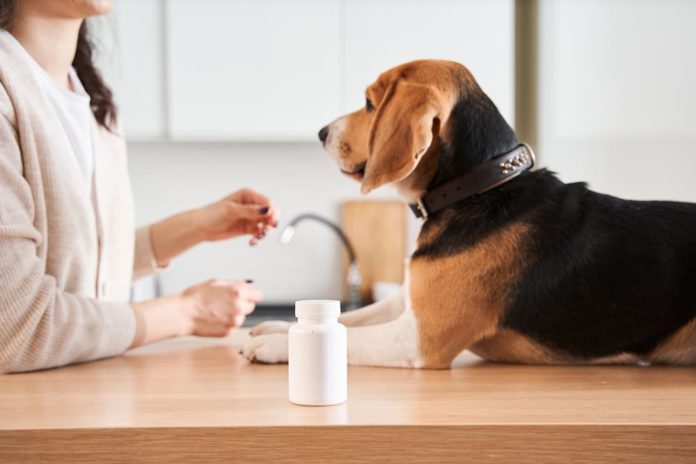Dogs, like humans, experience tummy troubles like diarrhea, upset stomach, and vomiting. And as a concerned dog parent, you may be wondering if Pepto Bismol, an over-the-counter medication drug helpful for humans, may work for dogs too.
The short answer is YES and NO. Pepto Bismol can help cure dogs of their digestive problems, but it’s safer to consult a vet before administering any pink tablet dosage.
What is Pepto Bismol?
Pepto Bismol is the leading brand of Bismuth subsalicylate that you can buy without a prescription. It’s available as a tablet or liquid syrup, and people with tummy troubles are very familiar with it.
It’s known to have antidiarrheal, antibacterial, and anti-inflammatory effects on humans, making them effective at treating acute GI ailments. Since it’s so effective for people, it must surely be effective for dogs, right? Before giving your dog a dose of Pepto Bismol, you need to understand its effects first.
Dogs, unlike humans, have sensitive tummies and what you think is a general stomach upset may be a sign of a deeper problem. While Pepto Bismol may give temporary relief, it can aggravate a deeper concern and lead to a more threatening condition for your pet.
The Common Side Effects of Pepto Bismol on Dogs
When it comes to canines, Pepto Bismol has the following negative side effects:
1. Turn a Dog Stool Black.
Pepto Bismol contains bismuth, an active ingredient that reacts with sulfur inside the stomach and makes stool black. It’s a harmless pigment, and the black stool may not be a cause of immediate concern. However, the black stool masks a graver condition called melena.
Melana is digested blood that appears in stool, making it black. There could be internal bleeding in the GI tract, causing blood to appear in the dog’s stool. If you went to a vet and they didn’t know that you gave your dog Pepto Bismol, they may think there’s internal bleeding.
On the other hand, what you thought was a harmless black stool caused by Pepto Bismol, is an indicator of a severe medical condition.
2. Cause Gastric Ulcers.
One of the active ingredients in Pepto Bismol is salicylic acid (or aspirin), which can give dogs gastrointestinal ulcers that cause bleeding. Since Pepto Bismol already turns stool black, this will further make the bleeding hard to detect.
If your dog is already taking aspirin medication or dog-specific NSAIDs (Non-Steroidal Anti-inflammatory Drugs) for various pain like arthritis, hip dysplasia, and other injuries, the risk of GI ulcers increases. Using Pepto Bismol together with steroids also presents a risk of stomach ulcers.
3. Interferes With Other Medications
If your dog is taking other medicines like anticoagulants and anti-biotics, Pepto Bismol can interfere with their effects. It can increase abnormal bleeding and reduce the effects of certain antibiotics.
Dogs using ACE inhibitors, diuretics, and digoxins should also avoid Pepto Bismol. Dogs suffering from acid reflux and taking omeprazole should also steer clear of Pepto Bismol.
4. Produce Inaccurate Laboratory Tests
Pepto Bismol tablets look like metal objects or foreign bodies inside a dog’s stomach. An x-ray may lead to an inaccurate diagnosis that will result in surgery.
Pepto Bismo can also cause incorrect urine glucose and ketone test results, making it challenging for your vet to accurately diagnose your dog’s condition and prescribe the correct treatment options.
5. Harmful for Pregnant And Lactating Dogs
Pepto Bismol is detrimental to a dog fetus or a nursing puppy. Never administer these chewable tablets to a pregnant or nursing dog because the salicylic acid ingredient can cause significant illnesses.
Is Pepto Bismol Safe for Dogs?
When your dog suffers digestive issues, bring them to a vet if the condition doesn’t resolve at once. Most canine digestive problems resolve on their own within a day or two. During the illness, feed your dog a bland diet until the diarrhea is resolved.
If you want to administer Pepto Bismol for immediate relief, administer the correct dosage according to your dog’s weight. The American Kennel Club recommends 1 tsp for every 10 pounds administered every 6-8 hours.
If you’ve never given Pepto Bismol before, consult with a vet first, especially if you’re unsure of the proper dosage. However, if your dog experiences loss of appetite, lethargy, vomiting, and very dark or bloody stools within the day, then go to a vet immediately.
If you’ve given them Pepto Bismol, let your vet know so he can recommend suitable treatment options. Caring for pets involves a lot of responsibility. Human medications don’t always work for dogs. Always consult a vet to know how to help your dog get through a stomach illness.
For more articles about pet safety, check out our resources at Be Safe.

Daisy is the engine behind Be-Safe.org — from content production to product reviews and more. What drives her is the passion to make home security information easily available.





